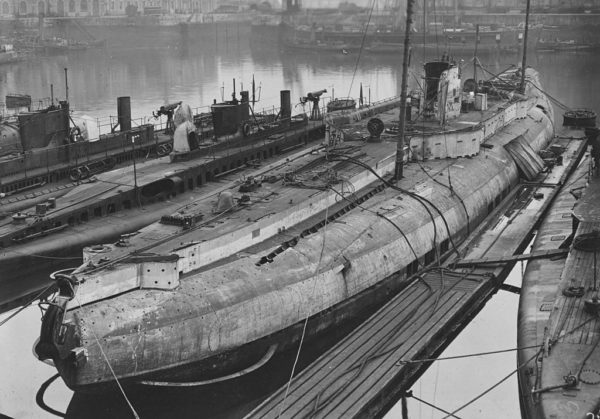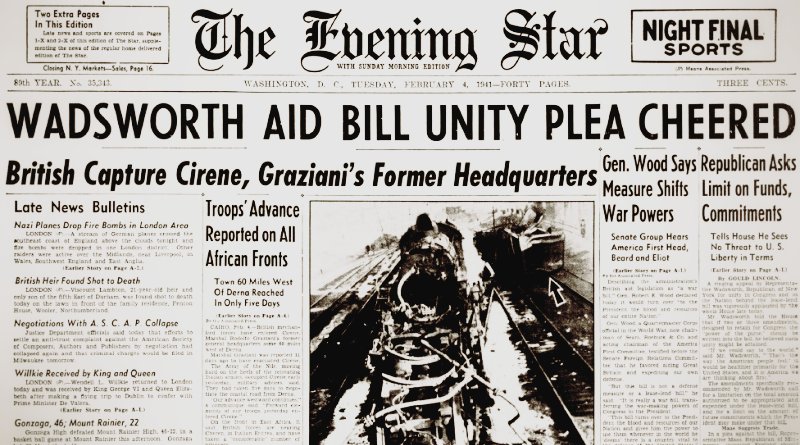World War II Chronicle: February 4, 1941
Click here for TODAY’S NEWSPAPER
Page 2 of today’s edition mentions Martin Niemöller, a German Protestant minister who reportedly converted to Catholicism while imprisoned by the Nazis. You’ve most likely heard his famous quote:
“First they came for the socialists, and I did not speak out—because I was not a socialist.
Then they came for the trade unionists, and I did not speak out— because I was not a trade unionist.
Then they came for the Jews, and I did not speak out—because I was not a Jew.
Then they came for me—and there was no one left to speak for me.”
Niemöller, a U-boat skipper during World War I who earned the Iron Cross 1st Class, was opposed the Weimar Republic so he originally supported Hitler and the Nazi Party’s rise to power. That may sound inexcusable now, but 90 years ago Germans didn’t know that Adolf Hitler would exterminate millions of Jews and other Untermenschen, cause millions of his soldiers and civilians to die in a losing war, which as a result of losing, doomed eastern Germany to 50 years under communist rule.

80-plus years later, we see clear warning signs from what Hitler said and wrote. Yes, the Weimar Republic was bad, and European reparations were especially harsh on Germany after World War I. But national socialism’s cures were far worse than the disease. As the Nazi Party’s power grew, Jews were rounded up and sent to ghettos. Citizens like Niemöller were spied on, pressured, arrested, or just disappeared. Anyone could be a Gestapo informant so you couldn’t trust your own children any more, much less your neighbors.
Warning signs aside, it’s hard to judge Niemöller and other Germans who had no way of knowing what we know up to this point of the war. The Nazis “came for the churches,” and Niemöller was arrested for crimes against the state in 1937. Fined and released — after nearly a year in captivity awaiting trial — the Gestapo quickly snatched up Niemöller and sent him to the concentration camps where he spent the rest of the war under “protective custody.” No matter how useful you are to the State during their rise for power, everyone outlives their usefulness eventually, and then the tyrants come for you.
Since Niemöller remained a prominent figure in the Protestant church after the war, so we don’t know what was behind the story of his conversion to Catholicism. It’s possible that the Nazis wanted to demoralize his former congregation. Volunteering to return to the U-boat fleet in 1939 was unsuccessful. Maybe the Catholic church didn’t give the Nazis as much trouble as the Protestant branches, so he thought a public conversion to Catholicism might be more likely to score his release.
Warning signs
Maybe you’ve been in a discussion about gun control, Gestapo-like tactics, or other common strategies of tyrannical regimes and heard someone naively say, “Yeah, but that could never happen here.”
Why not?
People will always want power and some will do whatever it takes to get it. Consider the situation in modern-day America: politicians have openly called for — and in some cases have carried out — gun confiscation, spying on and imprisonment of political opponents, and re-education camps. First, know that this is not a discussion about what I think could happen; by the time 80 years have passed, those events either will or won’t have occurred. So let’s say we do descend into tyranny, our descendants will be asking the same things about us that we do about the Germans: how could they have missed it? The warning signs were everywhere. They told us what they wanted to do, but people didn’t listen, didn’t care, wanted it to happen, or thought it could never happen here. Socialism was still a relatively new concept in 1941 that hadn’t killed 100 million people yet, so the Germans get credit for the fact that they didn’t know what we should know.
Just ask yourself this: if the Germans knew then what we know now, would they have done anything differently? And if they were around to see the direction that the United States was headed, what advice do you think they would have for us?
Tyranny is not a 20th Century German problem; it is a human problem, and it most certainly can happen here.
Evening star. (Washington, D.C.), 04 Feb. 1941. Chronicling America: Historic American Newspapers. Lib. of Congress.
https://chroniclingamerica.loc.gov/lccn/sn83045462/1941-02-04/ed-1/
